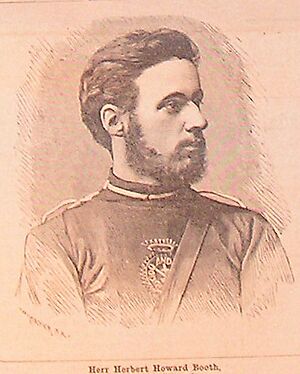Herbert Booth facts for kids
Herbert Henry Howard Booth (born August 26, 1862 – died September 25, 1926) was an important leader in The Salvation Army. He was the third son of its founders, William Booth and Catherine Booth. Herbert later became an independent evangelist, sharing his faith with others. He was also known for helping to create the Limelight Department, which made early films. He even wrote and directed a famous film called Soldiers of the Cross.
Early Life and Beginnings
Herbert Booth was born in Penzance, Cornwall, England. Even though he didn't have much regular schooling, he studied at Allesly Park College and the Congregational Institute in Nottingham.
When he was 20, Herbert started helping his sister Kate Booth build up The Salvation Army in France. Just two years later, he was put in charge of training new officers in England. Herbert was very talented; he wrote many songs for The Salvation Army and became a band leader and a song leader. He was also the first Salvation Army officer in England to use a magic lantern for presentations. This was like an early projector, showing images to an audience.
In 1886, Herbert became ill and traveled to Australia to get better. While resting in a mining town there, he found a gold nugget! He later used this gold to make a ring for his future wife, Cornelie Schoch, who was also a Salvationist from the Netherlands.
Leading The Salvation Army
At 26, Herbert Booth took charge of all Salvation Army work in the British Isles. From 1892 to 1896, he was the leader for The Salvation Army in Canada. After that, he moved to lead the work in Australia and New Zealand. Even though he struggled with his health and felt down sometimes, he worked very hard in this role.
In Australia, Herbert became very interested in The Salvation Army's Limelight Department. This department used new technology to create films and presentations. Herbert allowed them to grow a lot. Because of his support, Limelight made Australia's first story film in 1897.
The next year, Herbert and an early cinematographer named Joe Perry created Social Salvation. This was a special show that used different types of media to tell about The Salvation Army's work in Australia and New Zealand. While he was in charge there, Herbert also started the Hamodava Tea Company. This company was a pioneer in "fair trade", meaning it made sure tea farmers were paid fairly. The money earned from the tea helped fund The Salvation Army's work.
Herbert had some disagreements with his brother Bramwell Booth, who was also a leader in The Salvation Army. He hoped that spending time with his father, William Booth, would help fix things. It didn't, and Herbert felt very sad. To feel better, he started many new projects. Seventy projects were launched to celebrate his father's 70th birthday. One big project was building a training center for officers in East Melbourne.
To encourage people to join, Herbert wrote and directed Soldiers of the Cross. This was a show that told stories of early Christian heroes. Soldiers of the Cross, filmed by Joe Perry, first showed in Melbourne on September 13, 1900.
In early 1901, the stress from his family disagreements became too much for Herbert. He decided to leave The Salvation Army. He knew this would mean being separated from his family, but he felt he had to go. He wanted to take Soldiers of the Cross with him. After long talks, it was agreed that he would give The Salvation Army the rights to all the songs he had written in exchange for the film.
In August 1902, Herbert and Cornelie sailed to San Francisco to start a new life. Herbert used Soldiers of the Cross in his religious campaigns in the United States, Canada, England, New Zealand, and Australia for many years.
Later Life and Passing
While Herbert was visiting New Zealand in 1920, his wife Cornelie passed away in England. Three years later, he married Anne Lane, who had been Cornelie's travel partner and was also a former Salvation Army officer. Herbert Booth passed away three years after that, in New York City.
Filmography
- Social Salvation (1898)
- Soldiers of the Cross (with Joseph Perry) (1900)
 | Delilah Pierce |
 | Gordon Parks |
 | Augusta Savage |
 | Charles Ethan Porter |


